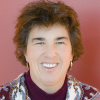Event focuses on discerning a call from God
Everybody hears the call of God differently. In the Bible, the child Samuel was awakened by a voice in the night; the apostle Paul was knocked off his horse. In early Methodism, John Wesley’s heart was strangely warmed, and, in the Baltimore-Washington Conference, God is calling teenagers to preach who cannot drive, teachers to minister despite a terminal illness diagnosis, and “JewCathMethocostals” to serve in prisons as the “green berets” of Methodism.
On Feb. 2, fifty seekers and their friends gathered at the BWC Mission Center in a summit on Living Your Call, sponsored by the Board of Ordained Ministry and Center for Clergy Excellence.
The purpose of the day, explained the Rev. Kirkland Reynolds, chair of the BWC's Culture of Call Committee, was to equip and strengthen people so that they can move forward in discerning how God is moving in their lives.
Many of those present were exploring possible calls to ordained ministry, others were wondering how they might more fully live out their sense of call to make a difference in the world with their daily actions and choices in their churches and communities.
The Rev. Tony Love,
“In both places, both faith traditions, God was shaping me, possessing me, preparing me and letting me know I was God’s own,” he said.
But one’s call is seldom a nice straight line. It has dips, curves, and angles; it doubles and loops back around. “But it is still God leading you, us, forward into a divine destiny, a preferred future, our calling,” Love said.
“Our
During the summit, Reynolds walked a panel of five people through sharing their call stories.
Yolanda Perry, a certified minister at Asbury UMC in Annapolis, shared how she was a high school educator, facing a cataclysmic health event. She had lost her faith and her future and one morning
She told her husband and son to stop packing. God gave her strength, hope and a voice, she said. “I knew God would hold my hand and I would follow.” She stayed in her job.
That was in 1994, 25 years ago, and she is still alive today, serving as a Certified Lay Minister and “living as a baptized believer in Jesus Christ.”
Pat Marks is a Deaconess, one of 167 women in the United States who works as a Deaconess. “Deaconesses make their own way in the world. We make our own placement. We are on the front lines. We are the green berets of The United Methodist Church,” she explained.
Marks came to United Methodism at 46, from a mixture of traditions she calls “JewCathMethocostle."
She holds a variety of jobs to make money, but her heart is in prison ministry. Her call and her work
In other sharing, the Rev. Jenny Smith told about how she grew up in a farm family and became a minister at her local church before she could legally drink or drive the church bus.
Smith suffered from a bone marrow disease in middle school and bargained with God. She thought she’d end up a chaplain, but God called her, at age 17, and led her into ordained ministry.
She believes her call is an evolving one, and she works to stay faithful to listening for how God will employ her.
In the sharing of these and other call stories, those gathered were asked to consider how God might be moving in their lives, and how their experiences fit into the opportunities The United Methodist Church offers for varying kinds of ministry.
The Rev. John Nupp, the BWC’s Executive Minister for Call and Clergy Care, spent the afternoon walking people through these possibilities and the logistics and steps the church lays out for following one’s call.
One of the first places to start, he said, is with the resource “The Christian as Minister: An Exploration Into the Meaning of God’s Call.”
But Nupp also stressed that he and his office are available to answer any questions and to begin any conversations people might have.
Nupp is hopeful that the people gathered and others sensing a call, “take one simple step that leads you closer to the wonder, closer to the One who takes ordinary people and transforms them into miracles."
“In my life, on my journey, in my call, I thought I had to fix some things before I was good enough to be called,” Love said. “But God was just waiting for my 'yes.'”
He encouraged everyone thinking about
God, Love said, “just wants your
For more information on

